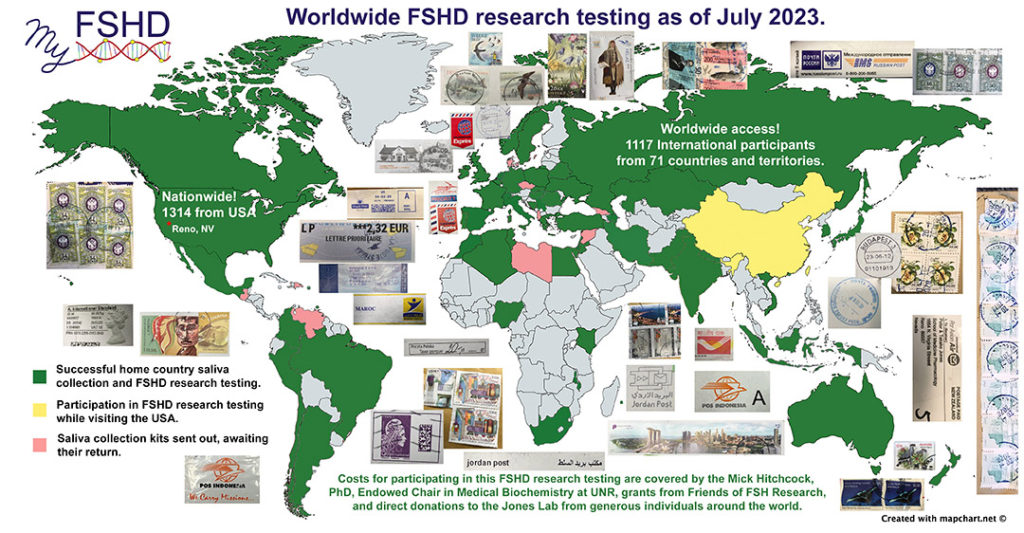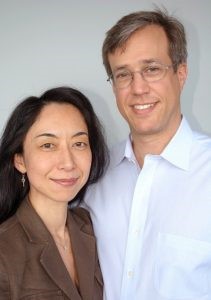We educate. advocate. connect.
THE THREE LITTLE (FSHD) PIGGIES // “We don’t get a lot of things to really care about.” So, you think you are interested in science, eh? Well, let’s see how the sausage is made. Today we share our experience generating the FSHD-like minipig models, which will be key tools for testing and advancing better FSHD therapeutics and developing methods for building back your muscles. Catch this episode (and all the others too) on your favorite app (search MyFSHD), or CLICK HERE TO LISTEN.
We are dedicated to educating people worldwide about all aspects of facioscapulohumeral muscular dystrophy and connecting them with FSHD research projects.
Learn about FSHD, the most prevalent muscular dystrophy affecting females and males of all ages and ethnicities.
Important! The Peter and Takako Jones Lab research test is paused for U.S. participants while results are being analyzed
In spring 2023, we reached our initial goal of 2,000 participants worldwide for our FSHD research test and paused our test for U.S. participants while we analyze results. Once we’re done, we’ll publish the results and do a complete evaluation to refine and revamp our program to better serve you. More to come!
Thank you to all who have participated worldwide! Meanwhile …
- For those who mailed back kits and are awaiting results, we are continuing to process those now.
- If you’re in the U.S. and have a test kit that you haven’t mailed in yet, no worries — send it in!
- International participants: We are still accepting international requests for kits during this period. Complete this form to request yours.
Welcome to MyFSHD!
For those facing FSHD head on every day and those who wonder if they may have the disease, there are many unknowns and even more questions. Based in Reno, Nevada, USA, MyFSHD is a source for education about all-things-FSHD. Scientists Drs. Peter and Takako Jones, whose sole focus is facioscapulohumeral muscular dystrophy, other scientific contributors, and ambassadors across the globe who battle the disease, aim to help the worldwide FSHD patient community find answers about their FSHD status through education, advocacy and saliva-based FSHD research testing accessible worldwide, at no cost to individuals. Spend some time on our website, view our videos and catch our MyFSHD Podcast.
What is FSHD?
MyFSHD on Facebook
Facebook.com/MyFSHD.org
On Facebook, search @MyFSHD.org
The Peter and Takako Jones Lab's research project and no-cost FSHD test is worldwide! Everyone, everywhere can learn about their FSHD.


Our scientists and the science
Dr. Peter L. Jones, PhD, and Dr. Takako I. Jones, PhD, developed a novel method for identifying and distinguishing all forms of facioscapulohumeral muscular dystrophy. They perform FSHD research testing in their research lab, the Peter and Takako Jones Lab, located at the University of Nevada, Reno School of Medicine, in Reno, Nevada, USA.
Their research focus is on facioscapulohumeral muscular dystrophy, which is the most prevalent muscular dystrophy that affects males and females, children and adults.
They effectively combine Dr. Takako Jones’ expertise in molecular biology, developmental biology and cell biology with Dr. Peter Jones’ expertise in epigenetics, gene regulation and biochemistry to address questions from multiple angles.
People who’ve done the test
Stories from FSHD research testing participants
Read the true stories of some who have participated in this research testing. (Names have been changed.)
Click the red accordion bars to open/close them.
Jim, in his 40s, went to his neurologist complaining of muscle fatigue and weakness and was clinically diagnosed with FSHD. However, both his genetic tests for FSHD1 and FSHD2 came back negative.
His neurologist, very experienced in FSHD, insisted he had FSHD and thought that Jim’s condition might be a new form of the disease. Jim enrolled in the FSHD research testing project at the Peter and Takako Jones Lab at the University of Nevada, Reno, where he was found to have the genetic and epigenetic signatures of FSHD2.
Jim went back to his neurologist with the result, was retested for FSHD2 using a different diagnostic company, and was confirmed to have a documented FSHD2 mutation that had been missed in the original test.
Maria, 50, has had progressive muscle weakness since her 20s. She was genetically confirmed as FSHD1 in 1998 by Southern blotting deletion testing.
Since FSHD is heritable, she had her two young children genetically tested, with one child, Joseph, testing positive for FSHD1, despite having no clinical signs.
Recently, Maria and her family enrolled in the FSHD research testing study at the Peter and Takako Jones Lab at the University of Nevada, Reno, participating as confirmed FSHD1 and healthy controls to help with assay validation. However, the results indicated that all three participants did not have FSHD.
Research testing determined that Maria and Joseph most likely had an FSHD1-sized contraction on a nonpermissive 4qB chromosome. Evidence of a contracted 4qB chromosome was then confirmed using standard genetic testing at a CLIA-approved facility, and the results were deemed “not consistent with FSHD.”
It was determined that the original FSHD genetic testing had not assayed for a permissive 4qA chromosome and thus left the family members with an incorrect diagnosis for over 20 years.
Andreia was clinically diagnosed with FSHD in her late 20s. She wanted to know if her child had inherited her disease, but they live in a country with no access to FSHD genetic testing.
After hearing about the possibility of accessible FSHD research testing on a Facebook group, she and her child enrolled in the project at the Peter and Takako Jones Lab at the University of Nevada, Reno.
Although it took several months due to international shipping delays, her condition was confirmed as being consistent with FSHD1 genetics and epigenetics. Importantly, her child’s genetic and epigenetic signatures were found to be inconsistent with FSHD, and the testing further confirmed that they did not inherit the familial FSHD1 chromosome.
Ahmed has an adult onset myopathy with some muscle weakness that is somewhat consistent with that found in FSHD; however, his FSHD1 genetic test came back negative.
Despite having no family history of FSHD, he was told he must be FSHD2. His physician refused to approve additional testing, so no FSHD2 test was performed.
Ahmed enrolled in the FSHD research testing study at the Peter and Takako Jones Lab at the University of Nevada, Reno, to confirm his potential FSHD2 diagnosis for his own peace of mind; however, the analysis of his genetic and epigenetic signatures found no indication of FSHD2.
This allowed him to make the decision to enroll in a different research study investigating the potential for indications of other neuromuscular diseases.
Jackie has had increasing muscle weakness in her upper arms since her teens, and based on her online investigations, she suspected that she has FSHD.
However, she can’t afford to pay for testing and her insurance will not cover it. She also does not want any official FSHD diagnosis on her medical record for fear of how if might impact her insurance or employment.
Jackie enrolled in the FSHD research testing study at the Peter and Takako Jones Lab at University of Nevada, Reno, at no cost to her and received her research results indicating that her genetic and epigenetic signatures are, in fact, consistent with being FSHD1.
She understands that this result will not qualify her for inclusion into a clinical trial; however, she can now choose if and when to get officially diagnosed for FSHD, knowing her money will be well spent.
Henry was clinically diagnosed with FSHD, which was genetically confirmed as FSHD1 in a CLIA-approved laboratory.
When he found out that a distant cousin in his family had also been diagnosed as FSHD1, he became concerned that there may be others in the family that were at risk and unaware.
He convinced many members of his extended family to participate in the FSHD research testing project despite the fact that many of them felt perfectly fine.
Much to everyone’s surprise, a number of seemingly healthy relatives were found to have genetics and epigenetics consistent with FSHD1 and had inherited the familial FSHD1 chromosome.
This new information was met with a range of responses from the family, some of whom were not prepared for the possibility of being genetically FSHD.
It is important to understand that genetic FSHD can be clinically asymptomatic or very mild, yet passed on to the next generation with a more severe outcome.
Many individuals with known FSHD status have participated in the FSHD research testing to help validate and improve the procedure to get us where we are.
In addition, we have helped many individuals and families across the USA and around the world learn about their likely FSHD genetic status.
We have helped those with no access to any diagnosis, individuals unable to afford genetic testing, and others struggling with a misdiagnosis of FSHD (clinical, genetic, or both).
Often, we are providing confidential research testing results for children and adults who want to keep the information private.
Regardless of your motivation, please seriously consider if you want to know the results of the research testing and the potential implications of this information. While it is not a formal clinically relevant diagnostic result, the impact of learning this information can be surprising.
We are here to help make sure you understand the results and can help you find support, if needed.


